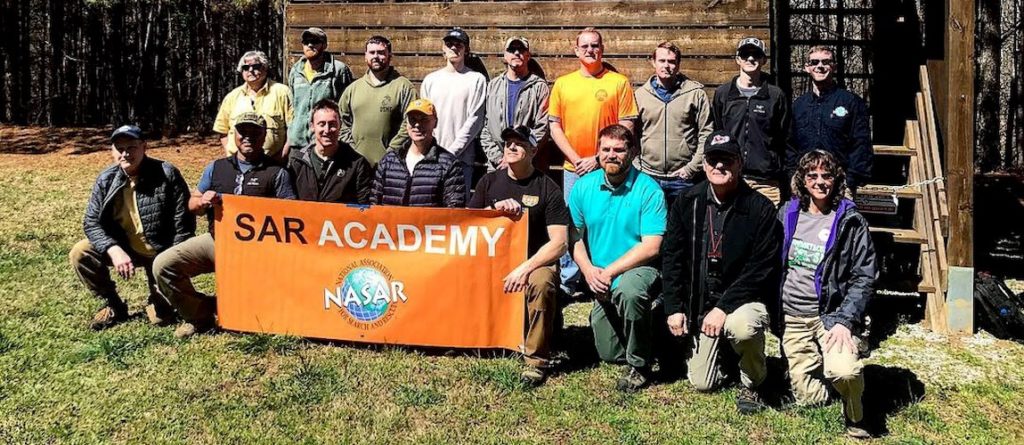

- This event has passed.
Lightweight Rescue
Two weekend course/exercise.
October 1-3, 2021 and October 9-10, 2021
Location: First weekend: RAT training area (Gallant, AL). Second weekend: Bucks Pocket State Park (Grove Oak, AL)
RAT-LRT (Lightweight Rescue Technician)
This course is limited to 12 students.
This 5-day (50+ hours) course combines the best of RAT’s technical classes into a single course for backcountry rescuers, climbers, cavers, or adventurers who may be immersed in rugged terrain for extended periods, or required to shelter in place without additional resources or a full complement of rescue gear. This is not a search class, although search techniques will be utilized. The course is designed as a skills enhancement / refresher for the lightweight search and rescue technician. The technical rescue portion of the class moves at a fast pace, so it is advised that students understand the basics of single rope technique / rope rescue in order to gain the maximum benefit from this course.
Students will be sent pre-course study information 2-weeks prior to the class. This pre-course work will include learning basic knots / rope skills, and the basics of map and compass. If you do not have previous experience, then the technical sections of the course will be difficult if you do not study the pre-course information. If you have previous experience in these disciplines, then pre-course study will not be required.
Course Itinerary:
Day 1: Wilderness Survival (shelters, fire building, water purification, tool use, survival / sar pack discussion, overnight in an improvised shelter)
Day 2: Land Navigation (traveling to a target, declination, determining distance, terrain association, reading a topo map, baselines, resection, USNG system, using a GPS and/or smartphone). Students will run the final navigation exercise at night using only map and compass. Expect some night search and rescue scenarios.
Day 3: Search and rescue scenarios with students in charge of incident command, as well as running field missions, setting up comms and deploying field repeater systems. Students will also be assessing patients, packaging and carrying patients in litters.
Day 4-5 (second weekend): Lightweight rope rescue techniques (single rope technique, anchorage, lightweight mechanical advantage, high directionals, lowers/raises, dual tension systems, small-party rescue techniques, and improvising with what you have). This part of the class will be held at Bucks Pocket State Park. Expect both day and night technical rescue scenarios.
What To Expect:
- Students will be in the field at least two nights, regardless of weather.
- Potable water will be provided – no water filters required.
- Extra clothing and food can be brought and left in your vehicle and accessed throughout the course.
- Although this class is designed around the backcountry rescuer, it will not require a lot of hiking since this is a skill building class. However, the student should be in average physical shape to complete the rope skills and patient litter carries.
- Do not expect an early release on Day 5. We will be in the field for at least 8 hours on the final day.
Required Gear:
- Pack suitable for 24-hour SAR missions
- Hiking Boots
- Fixed Blade Knife
- Ferrocerium Fire Starting Rod
- Water Container or Bladder
- Food (easily prepared in the field)
- Baseplate Compass (Suunto MC2 recommended)
- GPS (optional)
- Smartphone (optional – we suggest downloading the free Avenza app)
- Rain Gear
- Large Contractor Garbage Bag or Small Tarp
- Headlight (with extra batteries)
- Climbing or Rescue Harness
- Climbing Helmet
- Leather Gloves (suitable for rappelling/belay)
- Safety Glasses
- If you have your own technical rope gear, feel free to bring it
COVID-19 STATEMENT
As a result of the COVID-19 pandemic, the participation in group activities in which social distancing is difficult, if not impossible, is likely to result in the increased chance of exposure to the virus, which may increase the likelihood of contracting the disease. This exposure is possible through direct contact with other people, proximity to other people, and contact with surfaces that other people have had contact with. By participating in the activities, you represent that you do not have reason to believe that you have contracted the disease, have not experienced symptoms of the disease, or have been diagnosed with the disease. By participating in this activity, you represent that you have been informed of these risks and voluntarily assume the risks of potential infection of the disease. You also understand that there is the possibility that you may transmit the disease to others, even if you do not show symptoms of the disease.

